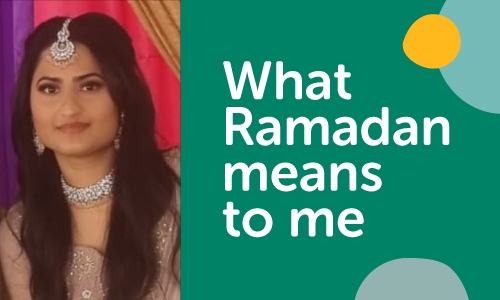What Ramadan means to me

This article will take approximately 3 minutes to read
Published 27 Feb 2025 in Colleagues
Observed by millions across the world, today we learn more about Ramadan from Resourcing colleague, Soniya Ali.
For Muslims, Ramadan is the best month of the year as we get closer to our Religion and learn the perfect way of life. It is important to ask if you need any adjustment whilst at work to help make your day a little easier. I have had amazing support over the years from my manager where she has been very understanding of the commitment it takes to be able to observe fasting and with accommodating my needs, whether it would be working from home, taking more frequent breaks and also taking the time to learn about what fasting is.
This is what a typical day would look like for me whilst observing fasting and maintaining a healthy work/ life balance.
4.30am- I usually wake up an hour before so I can help prepare breakfast with my family. This time is also known as Suhoor. It is important to have a healthy, balanced meal and lots of water to help keep you energised throughout the day.
5.35am- Fasting starts before the dawn prayer which is known as Fajr. We do this by reading a short prayer to make the intention for fasting which is the most crucial part of observing the fast. The intention is made with the purpose of fasting for Allah and the determination to fulfil the obligation of Ramadan. This helps us to perform our fast with awareness and dedication to the spiritual purpose of Ramadan.
8am- My typical work day will start from 8am to 4pm. During this time, there is the noon prayer known as Dhur (around 12.30pm) and the afternoon prayer – Asr (around 3.30pm). I would take short breaks during the work day to complete these prayers.
5.50pm- Fasting is broken at sunset with an Iftar meal. We break the fast with dates and water followed by a meal. We would then perform the sunset prayer know as Maghrib. There are also nightly prayers in Ramadan called Taraweeh which are performed after the night prayer- Isha. These are prayed with the family or at the Mosque and include the recitation of the Quran.
There are numerous spiritual benefits to fasting. Here are a few:
-
Increased Taqwa (God consciousness)
-
Self-Discipline
-
Purification of the soul
-
Empathy and Compassion
-
Gratitude and Contentment
If you are wondering how you can help support your Muslim colleagues during this month, here are a few ideas that I know we would appreciate.
-
Being mindful- maybe avoid scheduling meetings during prayer times or time of breaking the fast.
-
Asking questions in a respectful manner, we are more than happy to share our knowledge if you would like to know a bit more.
-
You may also want to participate and try fasting for the day or even breaking fast with your colleague.
I hope this gave a little insight into our life and helps to foster a more inclusive environment in the workplace. For any colleague that will be observing fasting during this month, Ramadan Mubarak.
What is Ramadan?
During the month of Ramadan, Muslims won't eat or drink during the hours of daylight. This is called fasting. Children are not expected to fast until they reach puberty, usually around the age of 14.
Ramadan remembers the month the Qur'an (the Muslim holy book) was first revealed to the Prophet Muhammad. The actual night that the Qur'an was revealed is a night known as Lailut ul-Qadr ('The Night of Power').
When is Ramadan?
The Islamic calendar follows the lunar cycle, and as such, the Ramadan 2025 dates will vary from the previous year; typically, it starts approximately 10 days earlier each year. So, when does Ramadan start in 2025?
This year, the Ramadan start date in the UK is expected to be 28 February 2025, and fasting will conclude on the evening of 30 March 2025. These dates are subject to the official moon sighting.
How is Ramadan celebrated?
Most Muslims fast between dawn and sunset.
Fasting allows Muslims to devote themselves to their faith.
It is thought to teach self-discipline and reminds them of the suffering of the poor.
However, children, pregnant women, elderly people and those who are ill or travelling don't have to fast.
During Ramadan, it is common to have one meal (known as the suhoor), just before dawn and another (known as the iftar), directly after sunset.
The end of Ramadan (Eid ul-Fitr)
The end of Ramadan is marked by a big celebration called 'Eid ul-Fitr' (the Festival of the Breaking of the Fast).
Muslims are not only celebrating the end of fasting, but thanking Allah for the strength he gave them throughout the previous month.
Mosques hold special services and a special meal is eaten during daytime (the first daytime meal for a month).
During Eid ul-Fitr Muslims dress in their finest clothes, give gifts to children and spend time with their friends and family. Muslims will also give money to charity at Eid.







